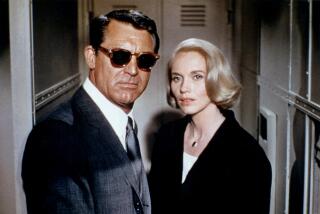Book Review : Lighthearted Romp Through a Literary Confidence Game
- Share via
Only When I Laugh by Len Deighton (Mysterious: $16.95)
The year is 1968. The main characters are a trio of con artists: Silas, a leftover semihero from the British North African Campaign in World War II; Liz, his sidekick and longtime girlfriend (whose father served with Silas in sad and mysterious circumstances during that same set of desert battles), and Bob, a young, working-class, undereducated ex-convict with a passion for self-improvement and archeology.
These three are world-class crooks, or so they like to think. Under the fanatical military drill of Silas, they work out split-second confidence tricks that involve two-way radios, props of every kind, arcane dialects, costumes, every variety of play toy. They pretend they con for money, but they really con for fun, and by the very end, of course, one of them has conned the reader.
“Only When I Laugh” is not a new book. It was originally copyrighted in Austria in 1967 and published in England in 1968. It is the work of a comparatively young man, and there is a lighthearted feel to it, a sweetness, that makes it a pleasure to read. (It’s the very opposite, for instance, of a droner like “Goodbye, Mickey Mouse,” in which war and its heroics are taken oh, so seriously. Silas, in fact, could be a parody of some of Len Deighton’s later heroes.)
The book is divided into three separate con attempts, each under the aegis of a separate character. In New York, Silas fleeces two wretched nits of their life savings, and one of them later kills himself. Which raises the question: Is this an honorable way for a gifted person to make a living? Should one really go around breaking hearts and lives? Liz has said earlier that she never thinks about marks, anymore than she thinks about a steer as she’s eating a filet mignon topped with bearnaise, but that may not be true. (All these people lie like rugs.)
The second caper, set up by Liz, is set in London and involves an emerging African country represented by an astonishingly likable bandit-politician, Ibo Arawa. In this case, the three get caught in the push-and-pull of world events and have to flee the scene, but not until they’ve bought two Rolls-Royces, guzzled barrels of champagne, gone on car chases through English country lanes, and spent many a cozy morning in their charming flat (over a mews) just playing: jumping up and down on couches, zooming around the room impersonating fighter pilots, landing in the fireplace and winning the Medal of Honor.
But through all this fun and money, compassion keeps seeping through. Young Bob, who, it almost goes without saying, is wildly in love with Liz, one day confides in her: “At the last stage of these capers I suddenly see the mark as my old man. I think, ‘It’s someone’s old man we’re making a sucker out of,’ and it gives me a pain in the gut.”
“That’s an occupational hazard,” Liz assures him brightly. “All jobs have dangers; leather workers get Anthrax, steeple jacks fall off a roof, pilots break up in midair. . . .”
But once human feeling has been acknowledged, it’s hard to deny it. And in one significant evening as the three of them watch old movies on television, Silas as much as tells Liz and Bob that if one of them were wounded, he’d leave the victim behind. He’d carry them for a while, perhaps, but he’d start giving them hints. He’d tell them his arm was aching. . . .
By the third caper, Bob has taken charge. Also, he’s won the heart of the delicious Liz, not by his criminal expertise, but by his lust for self-improvement and his tender heart. By now, the terrific trio are in Beirut--not the bereft city we see on the 6 o’clock news, but the flawed jewel of the Levant as it was in the 1960s: “. . . trays of sweetcakes and the yelps of unwanted dogs. Shiny American cars sliding along the waterfront under dusty palm trees. Men in baggy trousers arguing in shrill Arabic. Crew-cut kids, full of energy and know-how, streaming from the American University, and into the soda fountains for strawberry milkshakes.”
Success or Failure?
The lines are drawn now, the questions asked. Will this caper succeed like the first one, or fail, like the second? Will Liz decide, in the last pages, to stay with the master crook, Silas, or wander off with idealistic Bob? Is someone going to get his or her Karm-uppance, or will everyone get off scot-free?
By this last adventure, even Silas’ genius for costume and deception has been stressed to its utter limits: He is impersonating an Arab and an Englishman simultaneously (as I understand it), and this petite drama requires that--in a group of three--he appear English to an Arab, and Arab to an Englishman, which involves no end of skin darkener and prayer beads and morning suits and nerve.
Silas! What a guy. Mired in defeat, passing cowardice off as heroics, posing as a patriot and believing it, yet with all that, absolutely charming. Dressed for this last dual role, all alone in his bathroom, he speaks in the mirror to Gen. Rommel for a while, and then changes persona: “My God, Col. Lawrence, it’s you . . . no wonder the men call you the white phantom of the desert.”
Deighton has said that this is his favorite novel, and surely it will be a treat for his fans. The really nice thing is that his non-fans will probably like it too.
More to Read
Sign up for our Book Club newsletter
Get the latest news, events and more from the Los Angeles Times Book Club, and help us get L.A. reading and talking.
You may occasionally receive promotional content from the Los Angeles Times.









